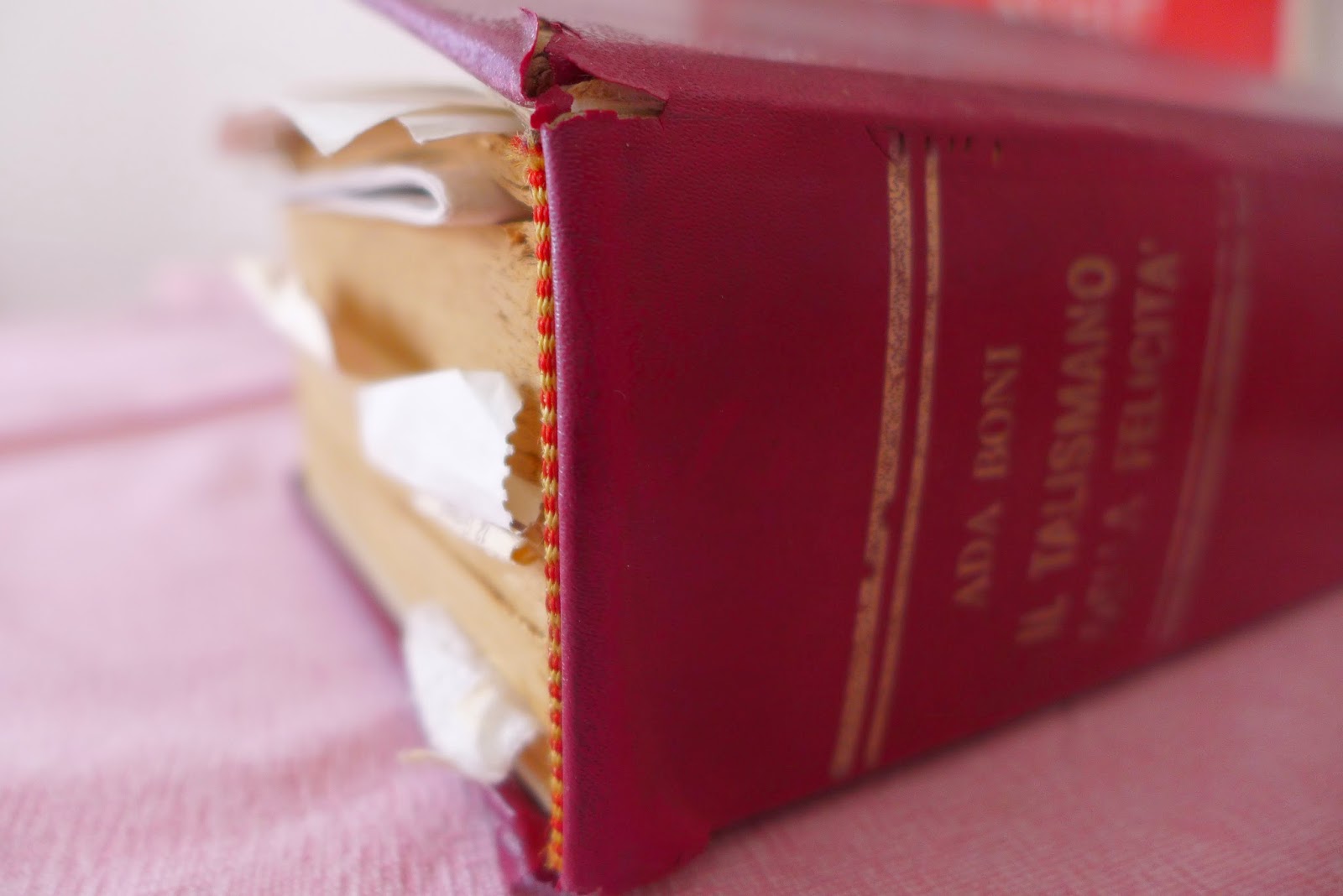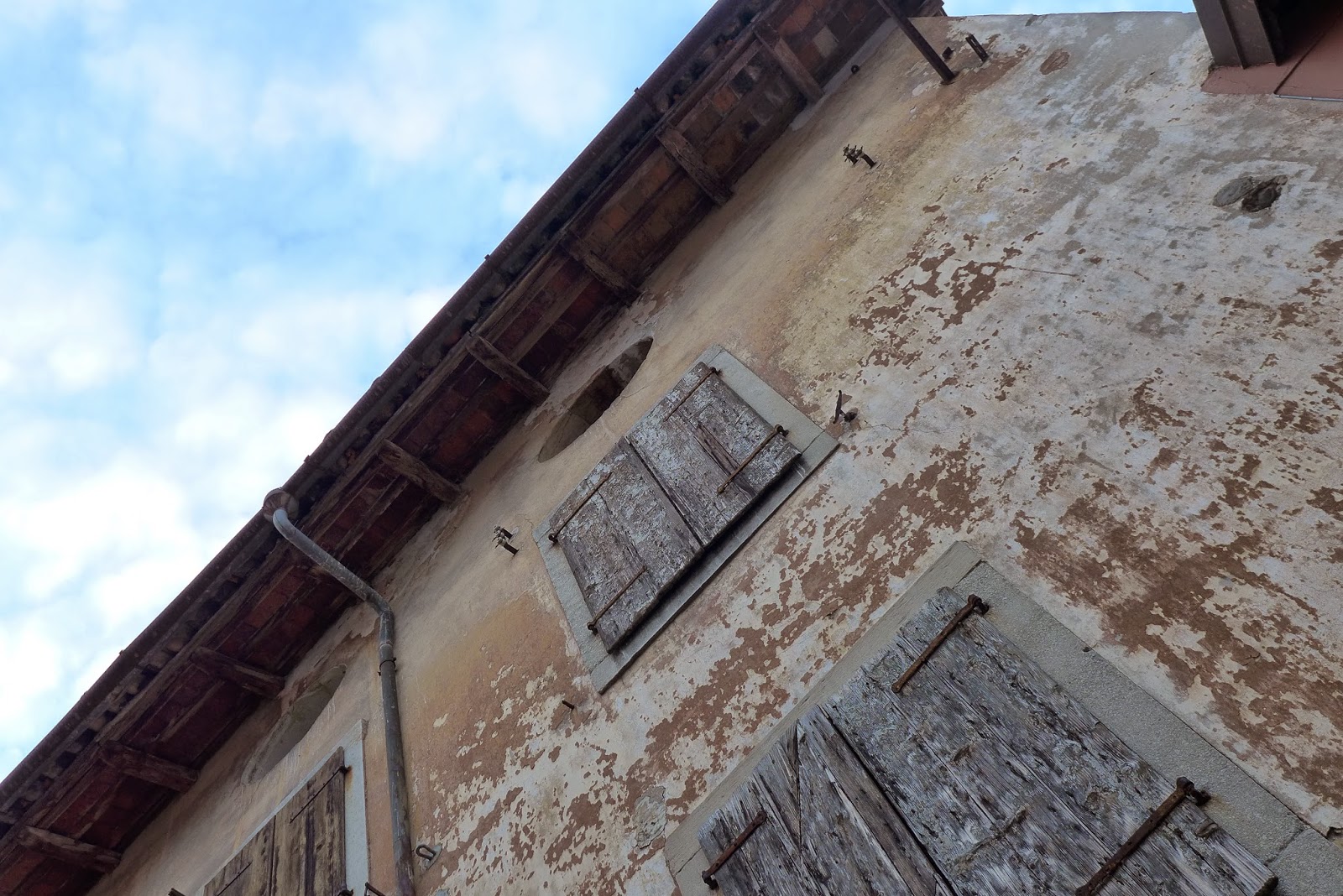The Talisman of Happiness
In my grandma's kitchen, sits a very old book. It is a cookbook- the ancestor of a book that I've been told women in Italy received traditionally as a wedding gift. My mother and my aunt have newer versions in their kitchens. Last year, my grandma gave me a second antique copy she owned that once belonged to a cousin. It is called the Talisman of Happiness, which is quite a lot for a book to promise, but perhaps not too far from the truth, since moments of communal eating often stand out as the happiest in our lives. My grandma's copy is well-worn and loved, its pages yellowed from time, where stray recipes written on random slips of paper have been slipped here and there between them. The book holds them together like a mother hen gathering her chicks under her wings. It is thick with these extra bits of paper and bookmarks, and they swell its belly so much that it barely closes. When looked at from the side, it resembles a cross-section of geological strata, binding layers of memory. It is a timeline with no logical beginning or end. I smile, looking at these haphazardly organized recipes, recognizing a similar organizational disorder in myself.
My grandma, now 94, still manages to occasionally whip up comfort dishes, and preoccupation for what one is to have for any given meal is of primary concern and always a headline in conversation. This is one of my family's modes of communication, where tempers and well-being are measured by what we've had to eat. Creating an entire meal from scratch is now too tiring for her, still, whenever I come to visit, she makes my favorite dish- pomodori in gratin- at least one time. Her will go continue to cook and do for herself, driven from an unshakeable drive for independence that I also mirror. When I visit her for lunch, as I was able to do several times recently due to my school’s February break, we sit in her kitchen, full of mismatched utensils and dented aluminum pots and pans that have braved many fires and blows in the front lines of meal making, and chat.
 |
| My grandma
While we eat, my grandmother tells me stories about our family and I love to listen to them. Most of them, I've heard dozens of times, but I enjoy each retelling, like wrapping up in a familiar blanket with repeating patterns that vary slightly one from the other- small variations between version, stitches added or dropped in places or fluctuating hues of the same yarn. Enveloped in these stories, I feel grounded. I have a history here, unlike in the US, where my family has no real roots.
Sometimes, stories get snipped out, surgically removed like an infected limb. My great-great-grandpa recently fell out of favor in these tales. He’d been the owner of a silk factory in Udine, whose building is now the Museo Etnografico del Friuli , one of the beautiful palazzi in the city. When I'd first moved to Istanbul, I had grown very curious about this great great relative, because he had traveled to Istanbul in the late 1800s and sent the last letter to his family from there, when he'd left them in search of healthy silkworms at a time when an illness in those tiny weavers was ravaging the silk industry in much of Europe. He was never heard from again and his end was the cause of some speculation. The thought of one of my relatives having lived in a much less populated Istanbul thrilled me and I made some attempts to find out if there was any record of his death here. He lived in my grandma's mind as someone who had lived out an unfortunate end in an attempt to save the family business. Recently, however, my great uncle received a letter from someone in Argentina with his same family name and now it seems that perhaps this great great grandfather ran away to Argentina and started a new life there, a much less noble ending to the story. This great great grandfather's brother's life also remains unmentioned, since
Most of her stories light up a youthful happiness in her as she recalls the times when my grandpa was courting her and their early married life. As a young doctor, he had gotten a post in a small town in Tuscany, where he befriended the town's priest and would play billiards with him at night. This put him out of favor with the communist party leaders, who controlled the town and butted heads with the priest. As a result, people who needed medical attention would come visit my grandfather late at night, so as not to incur any disfavor from the leaders of the town. My grandma said they were often wakened by the banging of a broom handle on their floors by patients needing medical attention.
The stories continue and my grandma lights up in the telling of them. They bring her back to the days when my grandpa was alive, when her kids were young, and their lives rolled out ahead like a vast plain. These collections of stories that make up a life, like bits of scattered papers clipped together, and the retelling of them a talisman of happiness.
|







Comments
Post a Comment